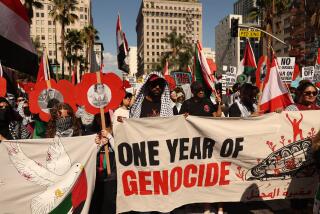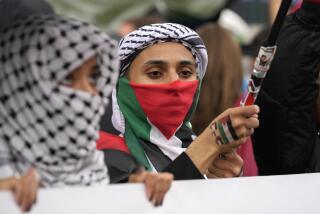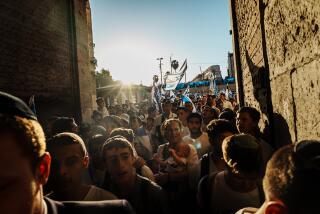Arabs Temper Their Anger In Latest Demonstrations
- Share via
CAIRO — Antiwar rallies in the Arab world ebbed Saturday after several governments appealed to their citizens to end days of violent protests.
About 700 protesters marched in the Syrian capital of Damascus, 200 people turned out in Amman, Jordan, and 10,000 Palestinians tramped through the streets of the Gaza Strip holding pictures of Iraq’s president. “We are with you Saddam Hussein and the people of Iraq!” they chanted.
But the protests were smaller and more orderly than in previous days.
In Cairo, students rallied at universities, but security forces did not permit them to leave the campuses. U.S. embassies in most capitals were closed, as is usual on Saturdays, but they were under heavy guard.
The depth of anger on the streets has jarred many Arab governments, which often walk a fine line between responding to public sentiment, maintaining security and not alienating friends in Washington.
Jordan’s King Abdullah II appealed to his countrymen late Friday to express their anguish for the Iraqi people in a “civilized way.” The Egyptian Interior Ministry, in an unusually conciliatory move, said it appreciated the emotions surrounding “regrettable developments” in the region and said it would allow demonstrations -- if the protesters had official permission.
Though Saturday’s rallies were smaller than others in recent days, emotions in the Arab world remain raw. For many, the images on TV throughout the day -- Iraqi soldiers’ hands held high in surrender, Baghdad being pounded by missiles and bombs -- were akin to salt poured into a festering wound, deepening the pain of humiliation and demoralization that dates back decades.
To a 22-year-old college student in Cairo, the images were a reminder that in his lifetime, and even in his modern history classes that cover three Arab-Israeli wars, two Palestinian intifadas and Israel’s occupation of Lebanon in 1982, he cannot recall a single Arab victory.
“Maybe Arabs are going to become extinct like the American Indians,” he said as he watched the explosions over Baghdad.
To one retired teacher, the U.S.-led assault echoed the events of 1967, when Israel smashed the armies of Egypt, Syria and Jordan in the Six-Day War.
“Do you know what losing that war was like?” the teacher asked his son. “I felt like I was walking down the street and a gang of men grabbed me from behind and raped me right there, for all to see. That’s how humiliating it was.”
Whereas the 1967 war came in an era of heady Arab nationalism, this one is occurring amid intense Arab frustration. But like the 1967 conflict, political scientists say, the Iraq war -- combined with the emotions inflamed by the Palestinian-Israeli conflict -- is likely to produce more religious and political radicalization and a growing sense among the young and disenfranchised that Arabs stand alone against the world.
Marwan Hamdy, 28, had to raise his voice to be heard Saturday in the courtyard of a Cairo lawyers syndicate. As he sipped thick Turkish coffee, militants and opposition figures milled about. Three or four people were using bullhorns, and their antiwar shouts became a din. Riot police, shoulder to shoulder with shields and batons, were not far away.
“In ‘67, a very dark time, many Arabs left for the West, but we don’t have that option anymore,” Hamdy said. “I had a visa approved to study in Australia. Everything was OK. Then 9/11. I went to pick up my visa and the consular officer said, ‘Sorry, we’re not permitting Egyptian travel to Australia now.’
“Even if we want to get out now, to immigrate, we’re trapped. Canada only wants people with money and skills. With the Americans, you never know what reason they’ll give Arabs for refusing a visa. You try Great Britain, and they’ll say: ‘There’s a lot of terrorism now. We don’t want people from Arab countries.’ Then it struck me: The world doesn’t want Arabs.”
This feeling of abandonment and isolation, political analysts say, has strengthened the bonds of Arab brotherhood.
Before the Palestinian intifada started in September 2000, “there were no political activities in my school,” said Dina Ahmad, 18. “When the Palestinians popped up in our discussions, some friends spoke negatively about them, saying they never appreciated our efforts for them in wars against Israel.”
“With the intifada, and the pictures on TV, such talk stopped. Everyone started saying they are our Arab brothers and they need our help. If we all act together, we can do something.
“Maybe you’ve heard the Egyptian proverb: ‘I and my brother are against our cousin. But I and my cousin are against the stranger.’ ”
More to Read
Sign up for Essential California
The most important California stories and recommendations in your inbox every morning.
You may occasionally receive promotional content from the Los Angeles Times.













